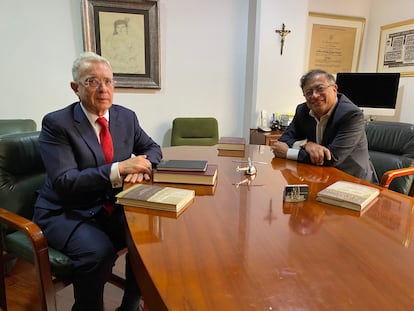Gustavo Petro has thrown his critics off balance in his first two weeks as president-elect.
In a conciliatory tone, he has called for the creation of a great national agreement around his government that lowers the high tension that presided over the electoral campaign and focuses on implementing the peace process that Iván Duque has boycotted in the last four years.
The two key appointments he has made so far are clear signs of moderation and the cordiality with which he has treated Álvaro Uribe, his historical enemy, and Rodolfo Hernández, the candidate who was about to snatch his victory, have for the moment created a climate of understanding after so much anger.
His followers, however, wonder if with that spa theme he will be able to carry out the reforms that the country needs.
Petro is convinced that these structural changes have to be made in his first year or they will never be made.
To carry out the tax reform that will help him square the battered finances of the State, he has relied on José Antonio Ocampo, a professor at the most prestigious universities in the world.
The appointment has had a favorable response from all sectors.
Ocampo agrees with Petro that alternatives to the extractivist economy that he has presided over in Latin America in the last century must be sought.
The minister distrusts the self-regulatory capacity of the market, while continuing to actively participate in it.
With a stroke of the pen, the president has warded off all the fears of those who believed that he was going to lead a protectionist and interventionist leadership of the economy.
Outside, Petro has chosen a conservative with whom he agrees on something fundamental: sitting down to negotiate is the way to end the violence in Colombia.
Álvaro Leyva, 79, has been a mediator in all the peace talks that have taken place so far in the country.
Both also believe that the elites misunderstand Colombia by believing that everything revolves around a white class that has ignored the regions and Afro-Colombianity.
Although he manages that speech, Leyva has a great acceptance among the right.
His will be the task of negotiating with the ELN, the last active guerrilla in the country.
Their disarmament would not have the same dimension as the negotiation with the FARC, but it would be symbolic in the country in which, along with Cuba and Nicaragua, the Marxist arms uprisings of the last century have had the greatest impact.
All these signs have been well received by those who had demonized the leader of the left.
The last two weeks of his campaign were focused on lowering the decibels of the political tension around him and showing many Colombians that his election was no leap into the dark.
He made an effort to show a presidential image, something that does not cost him because he has a great idea of himself and wants to face the historical presidents of the nation.
Few politicians have such a long career as his in local institutions, but around him, partly due to the virulent messages of his opponents and partly due to some clumsy movements of his own, an aura of a dangerous leftist who wanted to follow the Venezuelan path.
In fact,
His first appointment with a marked left-wing character is that of the playwright Patricia Ariza, who will be the Minister of Culture.
She is a feminist artist who has done work for years with marginalized communities, close to movements of independent artists, and who was one of the pioneers of what was called the New Theater in Colombia.
Ariza is 76 years old, seven years older than Ocampo.
Petro, who is 62, is entrusting his government to people older than him.
Álvaro Uribe, on the left, and Gustavo Petro, met last week in Bogotá to build bridges of dialogue between the two. GUSTAVO PETRO PRESS TEAM (Reuters)
Nothing that has happened so far is the product of chance.
Petro and his advisers, who found themselves with more difficulties than they expected to win the elections, had marked the road map until here.
Calling Uribe was not an impulse.
They knew that starting a dialogue with him would calm many fears, especially among the military.
Uribe remains the most respected figure among the generals.
In turn, the president of the Democratic Center, trapped in a judicial process for the purchase of witnesses that alters his retirement, needs Petro.
The image of the two sitting at the same table, with a crucifix behind them, after decades of disagreements, was very powerful for a country in need of reconciliation.
However, some sectors of Petrism did not love the picture.
For them, Uribe represents all the ills of the country.
They fear that the desire to please the Colombia that has not voted for him will stop him from implementing the policies that he promised in the campaign, with which he, with a certain grandiloquence, assures that he wants to transform the country.
"Whoever says that is that he doesn't know Petro," says one of his advisers, who says that he will start this task from the moment he puts on the presidential sash.
So did Juan Manuel Santos, who from the first minute announced a dialogue with the FARC.
And with that same energy he wants to start Petro, although without fanfare.
He sold himself as the quiet change and hopes to continue down that path.
Subscribe here
to the EL PAÍS newsletter on Colombia and receive all the key information on the country's current affairs.

